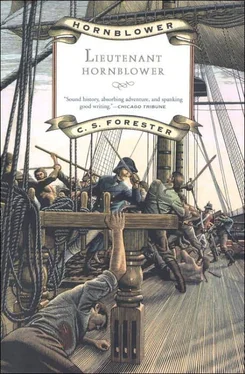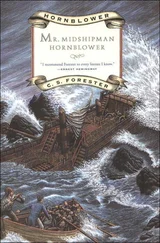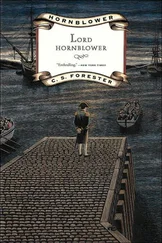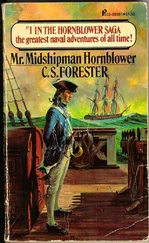“You can always find me here,” said Hornblower. “But—do you have a regular place to stay?”
“I stay where it’s convenient,” replied Bush.
They both of them knew that meant that he stayed where it was cheap.
“I lodge in Highbury Street. I’ll write the address down.” Hornblower turned to a desk in the corner and wrote on a sheet of paper which he handed to Bush “Would you care to share my room when next you come? My landlady is a sharp one. No doubt she will make a charge for a cot for you, but even so—”
“It’ll save money,” said Bush, putting the paper in his pocket; his grin as he spoke masked the sentiment in his next words. “And I’ll see more of you.”
“By George, yes,” said Hornblower. Words were not adequate.
Jenkins had come sidling up and was holding Bush’s greatcoat for him to put on. There was that in Jenkins’ manner which told Bush that gentlemen when helped into their coats at the Long Rooms presented Jenkins with a shilling. Bush decided at first that he would be eternally damned before he parted with a shilling, and then he changed his mind. Maybe Hornblower would give Jenkins a shilling if he did not. He felt in his pocket and handed the coin over.
“Thank you, sir,” said Jenkins.
With Jenkins out of earshot again Bush lingered, wondering how to frame his question.
“That was hard luck on young Wellard,” he said, tentatively.
“Yes,” said Hornblower.
“D’you think,” went on Bush, plunging desperately, “he had anything to do with the captain’s falling down the hatchway?”
“I couldn’t give an opinion,” answered Hornblower. “I’ didn’t know enough about it.”
“But—” began Bush, and checked himself again; he knew by the look on Hornblower’s face that it was no use asking further questions.
The Marquis had come into the room and was looking round in unobtrusive inspection. Bush saw him take note of the several men who were not playing, and of Hornblower standing in idle gossip by the door. Bush saw the meaning glance which he directed at Hornblower, and fell into sudden panic.
“Goodbye,” he said, hastily.
The black northeast wind that greeted him in the street was no more cruel than the rest of the world.
It was a short, hardfaced woman who opened the door in reply to Bush’s knock, and she looked at Bush even harder when he asked for Lieutenant Hornblower.
“Top of the house,” she said, at last, and left Bush to find his way up.
There could be no doubt about Hornblower’s pleasure at seeing him. His face was lit with a smile and he drew Bush into the room while shaking his hand. It was an attic, with a steeply sloping ceiling; it contained a bed and a night table and a single wooden chair, but, as far as Bush’s cursory glance could discover, nothing else at all.
“And how is it with you?” asked Bush, seating himself in the proffered chair, while Hornblower sat on the bed.
“Well enough,” replied Hornblower—but was there, or was there not, a guilty pause before that answer? In any case the pause was covered up by the quick counterquestion. ‘ And with you?”
“Soso,” said Bush.
They talked indifferently for a space, with Hornblower asking questions about the Chichester cottage that Bush lived in with his sisters.
“We must see about your bed for tonight,” said Hornblower at the first pause. “I’ll go down and give Mrs Mason a hail.”
“I’d better come too,” said Bush.
Mrs Mason lived in a hard world, quite obviously; she turned the proposition over in her mind for several seconds before she agreed to it.
“A shilling for the bed,” she said. “Can’t wash the sheets for less than that with soap as it is.”
“Very good,” said Bush.
He saw Mrs Mason’s hand held out, and he put the shilling into it; no one could be in any doubt about Mrs Mason’s determination to be paid in advance by any friend of Hornblower’s. Hornblower had dived for his pocket when he caught sight of the gesture, but Bush was too quick for him.
“And you’ll be talking till all hours,” said Mrs Mason. “Mind you don’t disturb my other gentlemen. And douse the light while you talk, too, or you’ll be burning a shilling’s worth of tallow.”
“Of course,” said Hornblower.
“Maria! Maria!” called Mrs Mason.
A young woman—no, a woman not quite young—came up the stairs from the depths of the house at the call.
“Yes, Mother?”
Maria listened to Mrs Mason’s instructions for making up a truckle bed in Mr. Hornblower’s room.
“Yes, Mother,” she aid.
“Not teaching today, Maria?” asked Hornblower pleasantly.
“No, sir.” The smile that lit her plain face showed her keen pleasure at being addressed.
“OakApple Day? No, not yet. It’s not the King’s Birthday. Then why this holiday?”
“Mumps, sir,” said Maria. “They all have mumps, except Johnnie Bristow.”
“That agrees with everything I’ve heard about Johnnie Bristow,” said Hornblower.
“Yes, sir,” said Maria. She smiled again, clearly pleased not only that Hornblower should jest with her but also because he remembered what she had told him about the school.
Back in the attic again Hornblower and Bush resumed their conversation, this time on a more serious plane. The state of Europe occupied their attention.
“This man Bonaparte,” said Bush. “He’s a restless cove.”
“That’s the right word for him,” agreed Hornblower.
“Isn’t he satisfied? Back in ‘96 when I was in the old Superb in the Mediterranean—that was when I was commissioned lieutenant—he was just a general. I can remember hearing his name for the first time, when we were blockading Toulon. Then he went to Egypt. Now he’s First Consul—isn’t that what he calls himself?”
“Yes. But he’s Napoleon now, not Bonaparte any more. First Consul for life.”
“Funny sort of name. Not what I’d choose for myself.”
“Lieutenant Napoleon Bush,” said Hornblower. “It wouldn’t sound well.”
They laughed together at the ridiculous combination.
“The Morning Chronicle says he’s going a step farther,” went on Hornblower. “There’s talk that he’s going to call himself Emperor.”
“Emperor!”
Even Bush could catch the connotations of that title, with its claims to universal preeminence.
“I suppose he’s mad?” asked Bush.
“If he is, he’s the most dangerous madman in Europe.”
“I don’t trust him over this Malta business. I don’t trust him an inch,” said Bush, emphatically. “You mark my words we’ll have to fight him again in the end. Teach him a lesson he won’t forget. It’ll come sooner or later—we can’t go on like this.”
“I think you’re quite right,” said Hornblower. “And sooner rather than later.”
“Then—” said Bush.
He could not talk and think at the same time, not when his thoughts were as tumultuous as the ones this conclusion called up; war with France meant the reexpansion of the navy; the threat of invasion and the needs of convoy would mean the commissioning of every small craft that could float and carry a gun. It would mean the end of half pay for him; it would mean walking a deck again and handling a ship under sail. And it would mean hardship again, danger, anxiety, monotony—all the concomitants of war. These thoughts rushed into his brain with so much velocity, and in such a continuous stream, that they made a sort of whirlpool of his mind, in which the good and the bad circled after each other, each in turn chasing the other out of his attention.
“War’s a foul business,” said Hornblower, solemnly. “Remember the things you’ve seen.”
Читать дальше









